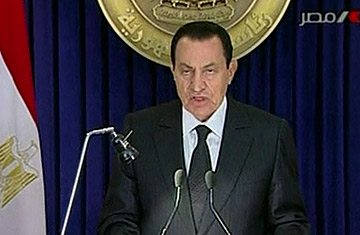
Egypt's President, Hosni Mubarak, addresses the nation on Egyptian state TV in Cairo on Jan. 28, 2011
Updated: Jan. 28, 2011; 6:00 p.m. ET
Early on Friday, Jan. 28, as Cairo plummeted into chaos, I saw a tank at the headquarters of Egypt's ruling party. It was a sign that the military had moved in, at the very least to protect the property of the National Democratic Party (NDP). The police, as thuggish as they had been with clubs and tear-gas canisters, were clearly not in full control and needed help from the army. But the truly stunning news came shortly afterward. The NDP headquarters had been not only looted but also set on fire. If the regime of President Hosni Mubarak, who has ruled for 30 years, could not keep popular fury from turning his party's home into an inferno, what sort of control did it truly have?
As a 6 p.m.–to–7 a.m. curfew was imposed, word went out that Mubarak would soon be addressing the nation. But it was hours before he appeared — and just as the capital was quieting down. Observers had wondered if there was anything the President could actually say that would make a difference. Friday saw a very clear shift from what had been primarily broad economic concerns to across-the-board demands that Mubarak relinquish power and leave the country. When he finally spoke, most Egyptians were stupefied. The speech could have been a carbon copy of the ones he delivers at the annual NDP conference. He did ask for the government to step down, but many saw that as a ploy to buy time and simply change the faces running the same regime. He did not acknowledge the calls for him to step down. The immediate public reaction was anger — which observers felt would provide momentum for further protests.
All day, the government had been flailing for a response that might appease its angry people. An hour before the curfew was imposed, I managed to make it into the official press center to see if the regime had issued any statement, any indication of what it would declare in the face of this immense mutiny of a once cowed people. The center smelled of tear gas from all the attacks in the streets. There was no official statement or clue as to a unified strategy that the ministries, the military and the NDP had put together to deal with the crisis. Indeed, in the walk-up to Friday, the Interior Ministry had declared that demonstrations would not be permitted and that protesters would be arrested. But then the secretary-general of the NDP said the youth of Egypt had a right to express themselves and to demonstrate.
There were other signs of internal contradiction in the regime. The al-Arabiya news network reported that Mustafa al Fikki, the NDP's chief of foreign affairs as well as the head of security in the shura council (the upper house of parliament), condemned the government's response to the protests and has apparently called for the resignation of the government. A source close to the regime has indicated to TIME that there was some remorse in some official quarters about the police onslaught, though that statement was qualified by saying the cops had to respond to stone throwers. The image it presented was bad, said the source, who then reluctantly added that responsibility for handling the crisis should be attached to the President. A change of government without a change at the very top is unlikely to make much of a difference to the mass of people who took to the streets.
The counterprotest strategy of the government has been limited to tear gas, batons and brute force — and, as the Friday protests approached, the shutting down of bridges and mobile-phone and Internet access. Says a source close to the government: "This is the only way to cut them off." To the protesters, that kind of mentality reflects fear. Magdi Mohammed, 27, who is unemployed, says, "My friends have relatives in state security that said that if the demonstration reaches 1 million people, there's nothing they can do. So they shut off all the phones and the Internet. They wouldn't have done that if they weren't scared of the people."
There has been so much anger directed toward Mubarak's government that people in the streets were willing to believe that stone throwers and looters, who turned out in force after dark, were government plants, sent into the street to cause havoc that could be blamed on peaceful demonstrators.
Mubarak's handling of the crisis may have contributed to Friday's massive opposition showdown with the regime. As I took refuge on a rooftop with a bunch of strangers who had escaped tear gas and batons in the streets below, one man, a surgeon, told me why he had attended Friday prayers and had brought his son with him to march in the protest immediately afterward. A friend of his son had been picked up by the police on Thursday, and the surgeon went to the detention center to try to get his release. "It was all kids," he said of the individuals the government had arrested. "It was all kids who had been kidnapped. I felt I had to do something." He had never been to a protest before in his life.
